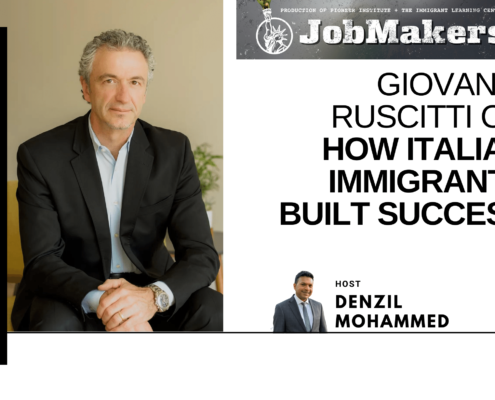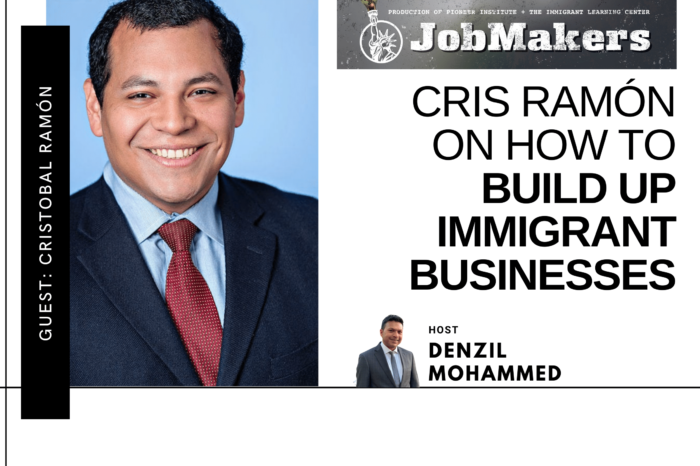Cris Ramón on How to Build Up Immigrant Businesses
/in Economic Opportunity, Featured, JobMakers /by Editorial Staff
This week on JobMakers, host Denzil Mohammed talks with Cris Ramón, son of immigrants from El Salvador, immigration policy analyst, and coauthor of the new report, Immigrant Entrepreneurship: Economic Potential and Obstacles to Success published by the Bipartisan Policy Center. For the report, he scoured the nation to learn not only what immigrant entrepreneurs need, but what municipalities and the federal government can do, to help build up these businesses. The report shows that immigrants are primed to take risks due to their willingness to move to the United States, but politicians aren’t doing much to facilitate that entrepreneurial spirit. The report offers case studies, recommendations, and stories that demonstrate the value and impact immigrant business owners can bring, as you’ll learn in this week’s JobMakers.
Guest
 Cristobal Ramón is a senior policy analyst with Bipartisan Policy Center (BPC)’s Immigration Project. Before joining BPC, Ramón served as a research consultant on immigration integration issues with the National Immigration Forum. As a graduate student, he interned with the Migration Policy Institute, the German Marshall Fund’s Migration Program and the U.S. Helsinki Commission. Ramón is a magna cum laude graduate of Macalester College and a graduate of the master of arts in international affairs program at the George Washington University’s Elliott School of International Affairs, where he focused on comparative U.S. – E.U. immigration policy. Ramón also researched Spain’s immigration policy as a Fulbright Scholar at the Universidad Carlos III de Madrid in Madrid, Spain.
Cristobal Ramón is a senior policy analyst with Bipartisan Policy Center (BPC)’s Immigration Project. Before joining BPC, Ramón served as a research consultant on immigration integration issues with the National Immigration Forum. As a graduate student, he interned with the Migration Policy Institute, the German Marshall Fund’s Migration Program and the U.S. Helsinki Commission. Ramón is a magna cum laude graduate of Macalester College and a graduate of the master of arts in international affairs program at the George Washington University’s Elliott School of International Affairs, where he focused on comparative U.S. – E.U. immigration policy. Ramón also researched Spain’s immigration policy as a Fulbright Scholar at the Universidad Carlos III de Madrid in Madrid, Spain.
Get new episodes of JobMakers in your inbox!
Read a Transcript of This Episode
Please excuse typos.
Denzil Mohammed:
I’m Denzil Mohammad and welcome to a special edition of Jobmakers.
Denzil Mohammed:
If you haven’t heard me say it yet, you haven’t been listening. Immigrants are twice as likely than average to start a business here in the us. And these businesses are having real local and national impact, but the reception to these business owners is uneven. And there are many municipalities that can learn from places that actively and authentically engaged with their newest residents and helped build up their entrepreneurial capacity to the benefit of all residents for Cris Ramon, son of immigrants from El Salvador, immigration policy analyst, and coauthor of the new report, immigrant entrepreneurship, economic potential, and obstacles to success published bipartisan policy center. He scoured the nation to learn not only what immigrant entrepreneurs need, but what municipalities and the federal government can do to help build up these businesses. The report shows that immigrants are primed to take risks due to their willingness to move to the United States. But politicians aren’t doing much to facilitate that entrepreneurial spirit. The report offers case studies recommendations and stories that demonstrate the value and impact immigrant business owners can bring, as you learn in this week’s Jobmakers, Cris Ramon, independent researcher and policy expert on immigration, welcome to the Jobmakers podcast. How are you?
Cris Ramon:
Thank you. Great to be here and very much open to having this great conversation with you and, you know, obviously happy to chat with you. You’ve been doing amazing work that I’ve been following for many years now, so it’s great to be here.
Denzil Mohammed:
Yeah. Thank you for that. You have been studying immigration for a very, very long time. You are Fulbright scholar studying migration as well in Spain. And you recently, co-wrote a report for the bipartisan policy center called immigration entrepreneurship, economic potential and obstacles to success. Could you just, just give a little background about you and then this project?
Cris Ramon:
Sure. so my folks are Salvador immigrants. You, I was born in LA. My folks actually met in Los Angeles, so they didn’t immigrate together, but they they came here actually the same year in 1974 through some pretty different routes. You know, my, my mom was an undocumented immigrant and my dad came here because my grandmother who immigrated to the United States in 1968 was able to get him and my my uncle you know, helped with processing their immigration cases because she cleaned the house of an immigration attorney. So they got really lucky in the lottery of life to be able to get be able to come here. So, you know, very much, immigration’s a part of my story. But you know, in terms of you know, the work that I do in this report, you know, I had an opportunity to really look into you know, why, why immigrants become entrepreneurs? What are the challenges they face sort of the, the policy responses that you see at the federal and local level and then policy recommendations to do that.
Denzil Mohammed:
So just give us an idea of the landscape of immigrant entrepreneurship. What, why did you find generally speaking, what kind of sectors are immigrants concentrated in? Do they have a higher rate of entrepreneurship? How are they impacting their localities and regions?
Cris Ramon:
Yeah, so I think the key thing is that you know, immigrants are you know, immigrants can, are represented across different industries. You always hear the story about the immigrant entrepreneur that starts a high tech startup in Silicon valley. But also you see immigrant entrepreneurs in main street businesses particularly restaurants and, and service industries. And so you, you do have this broad distribution. I think one thing to note with the distribution is oftentimes particularly immigrants who are here they will sometimes start businesses that rep represent or reflect the cultures that they came from. So restaurants obviously is a major story that comes up when you see these folks in terms of products, you know, one of the interesting stories that we heard about, you know, in this sort of vein is that there was a Syrian soap maker who wanted to make their soaps in the United States.
Cris Ramon:
And so they were able to, you know be able to put together their business in, in the St Louis area to be able to do that. So I think that that’s something that’s important, but the key thing there is that immigrants do start businesses at much higher rates than even native born Americans. And the data really backs this up. It’s, it’s just incredible to see how active they are in building the businesses. You know, it’s not to say that native born Americans aren’t like creating businesses. It’s just that immigrants are doing this at much higher rates. I think the last thing is in terms of the E impacts, you know, we didn’t dive into that information as much, but there is, you know, I think overall there is a sizable impact to be considered in terms of the, because there are just more immigrants, foreign businesses that the, that the impact has to be strong and significant because they are creating jobs that are employing individuals and they’re paying taxes. So I think that that’s really something to consider. It’s a, it’s definitely a win for the, the national economy, but for local economies as well.
Denzil Mohammed:
And we are recording this podcast over zoom guests who founded zoom an immigrant. Yeah, you paint a really good picture here. And, you know, if we open our eyes just to main streets and see the variety of businesses that we have the variety of cuisines that we have access to, that’s really unique and important for us. So you said you found that I read that rates of entrepreneurship for immigrants increased over the past few years and actually decreased among the us born, but, you know, COVID obviously affected many of these businesses in a very, very significant way. And you found that minority owned businesses, immigrant business owners suffered some of the highest losses. Can you tell us a little bit about that?
Cris Ramon:
Yeah. And, and I think, you know, the reason you see that those losses suffered is that particularly service industries or industries were minority business owners and immigrant business owners were really hit hard especially during the first year with, with the pandemic because obviously individuals largely remained at home. And so the fact is that if you have individuals who are using these services at lower rates, you’re gonna have businesses, you know, going under a lot more at higher rates. So I think that the distribution of these individuals and their businesses, unfortunately, really put them in a tough spot. When I came back from the pandemic,
Denzil Mohammed:
Well, I interviewed a guy called Daniel Perez. He’s a entrepreneur here in Massachusetts. He has a very successful transportation business. So transporting businessmen from the airport to their meetings, to their hotels. And obviously when the pandemic happened, people weren’t moving, people weren’t going anywhere. People were confined to their homes and he found a way to be able to use his vehicles in a profitable way during the pandemic. They became mobile health clinics during the pandemic. So some immigrants did find ways to navigate successfully throughout this very trying time. So when it comes to some of the hurdles you found, you know, obviously immigration status, the stagnant immigration policy, there are many, many reasons why immigrants should not be able to start businesses. What are some of the hurdles you found?
Cris Ramon:
Yeah. So to your point, I think with with the immigration system, I mean, first and foremost, we do not have a visa expressly designed for immigrant entrepreneurs. You’re an individual who needs to get funding from from a venture capitalist to be able to start your, your startup for instance, or you’re an individual who wants to start a mainstream business. There isn’t a, a visa for you to be able to come to the United States to do that. And, and, and so that’s kind of the first problem is that the, the ability to attract, you know, talent, at least through those channels just simply do not exist. You know, and the second issue with the immigration system is we’re not really designed to retain talent parti, you know, not just simply, you know, workers who can bring in their skills and stay here. I’m thinking obviously foreign students is one example who are here on an F student visa.
Cris Ramon:
And then, you know, if they don’t have a job lined up and get sponsored and be able to get a visa to stay here the, you know, their dire straits, we just do not have a status for these individuals to adjust into, to be able to become entrepreneurs. So we have this dual problem where we’re not able to attract talent or in this case, the, the ambitions, the skills, the knowledge, and the drive for immigrant entrepreneurs to come here and to be able to retain those individuals that they’re already here, but they’re on a temporary visa. That’s, that’s a major issue. You know, another issue is access to resources. So it’s, it’s, it’s interesting because, you know, one of the drivers of immigrant entrepreneurship is social capital. So the networks that you have you know, this is why you say you’re sort of seen over the course of American history, these immigrant enclaves emerge.
Cris Ramon:
And one of the reasons that, you know, those communities you know, have been able to really sustain themselves financially because a newcomer comes to the United States and they’re able to sort of navigate the, the, the business starting process. And this is obviously a long term project, you know, for, for many, you know, for decades even centuries in the United States with the history of immigration. But of course those social networks allow individuals to be able to navigate you know, the system to be able to set up their businesses. But the issue of course, is that if you’re a newcomer and you’re trying to start a business, now those issues around say accessing alone, maybe you don’t have a credit history in the United States. You don’t have assets to be able to offer to a bank. And, and, and so that can kind of put you at a disadvantage especially if you’re coming in and, and maybe you may not have the savings to do that. It’s not to say that it makes starting businesses impossible for immigrants but it certainly is a major challenge. So those are the two things to consider with the, the major, major obstacles that immigrant entrepreneurs face here in the United States.
Denzil Mohammed:
And despite this. So again, immigration status, immigration policy, as you say having a credit history, you know, 90% of, of immigrants who come here don’t even have a clue about a credit score. That’s something unique to the us language barriers, as you say, collateral having social capital is so important for anyone to succeed anywhere, having parents or children or cousins or family, or for any kind there. And yet still they have a higher rate of business generation, is that astonishing,
Cris Ramon:
You know, individuals come here and that’s a risky move. I mean, I, I recently just moved to Chicago. And, you know, there was a, you know, cost benefit analysis that I made. And it was still, you know, risky, but if you’re moving from one country to another oftentimes permanently you’re, you’re your, your ability to be able to assess risk and, and your willingness to do that, kind of primes you already to be able to take other risky steps, particularly start in businesses. And so I think that that, that the, that mitigate the experience of migraine to the United States really does mitigate the awareness you might have towards taking risks. So that’s one factor. Another important factor is, you know, a lot of these individuals who come to the United States are you know, they, they have knowledge, experience and skills, whether it’s formal channels that they, you know, they want to university or trade school, or it’s informal.
Cris Ramon:
You know, and sometimes it’s very hard to find jobs that can, you know, really fully use this in the United States. And especially if you’re, you’re coming in from a licensed profession, you need to get credentials renewed or, or need to take up additional study. And so these individuals oftentimes start their own businesses to be able to use the experiences that they’ve gained over a lifetime to be able to do the work that’s meaningful for them, and also probably to get paid at a decent rate. And, and so I think that there’s that also the drive saying I can’t find a way to integrate into the labor market. I will create my own path to do so.
Denzil Mohammed:
So what are some of the ways that we can address these issues? Let’s say let’s start at the federal level and then come down to the local level.
Cris Ramon:
Yeah. So, so Congress has recognized this issue. So I’m gonna give them pride upfront that they’ve recognized that this issue is something that that we need to focus on and they’ve proposed Democrats and Republicans. So it has been a bipartisan issue have proposed bills to be able to create a an immigrant visa and an immigrant status that people can adjust into if they’re already here and the visa will allow people to come here. But I think, you know, one of the key things that needs to be done is they just simply need to pass it. And I think that as much as I think that the, the, you know, that a comprehensive immigration reform bill, that addresses those multiple issues is the most ideal. I’m also being, you know, you have to be a little bit of a pragmatist and a realist and recognize that you may need to do reforms in a piecemeal fashion and and, and get the wins where you can get the bipartisan consensus where you can, and, and, and do that.
Cris Ramon:
At the municipal level, you are seeing cities really stepping up in, in some big ways to be able to provide technical assistance. And in some instances you know loan programs for minority owned businesses and immigrants. So you, you are seeing that there are the, these municipalities that are doing this. One of the interesting things in the conversations that I had with the experts on this, though, is that you, you wanna be able to, first of all you don’t wanna have services. And, and I didn’t really dive too deeply into this, into the report, but I can say this a little bit more now here. One of the things that somebody who works in the Mid-Atlantic city, he mentioned that one of the, one of the well intentioned efforts is to have a lot of funding to be able to provide technical services for minority potential minority business owners and immigrants.
Cris Ramon:
And that’s good naturally want the funding. The problem is that the funding actually started going into duplicative technical services that didn’t really adjust to the needs of the communities. It was just simply the same program. He literally almost said it’s basically almost like a copy and paste job, and, and that doesn’t benefit anybody. So one of the things that he said that municipalities really need to do is they do, you know, their services and, and see where they can try to re reduce redundancies and adjust the services to meet the actual needs of, of the, the individuals that they’re meant to serve. Another issue is obviously language services providing them in languages, and also recognizing that the immigrant populations are gonna shift. So just because you are providing languages language services and five languages in you know, 2018, that’s not to say that in 20, 22, the population hasn’t shifted.
Cris Ramon:
So that’s something else to consider. There’s trusted community navigators as a, that’s an important component of this is that you need to be able to reach out to the community and have the folks that people trust to be able to sort of do outreach to immigrant entrepreneurs and to know what their needs are and how you can access them. Some of these can be, you know a mayor who goes out and, and actually connects with the community with other members of important leaders in, in their communities, whether it’s police chiefs or, or representatives of chambers of commerce. But it can also be you know, nonprofits, chambers of commerce, community development corporations that can help you get a little bit more in the sense of what the actual needs are. I will say I will point to one interesting example of, I did think was really interesting in terms of particularly kind of doing this all well, is that you know, the, the city of Philadelphia ended up kind of canceling all these grants for these programs and actually just brought in, they had a common pot and they brought in consultants 10 99 experts who could provide targeted services depending on the needs of the community at any given time and pairing them up with individuals.
Cris Ramon:
Not only are they saving money because they don’t have to pay into healthcare or pensions, or what have you they’re able to bring in individuals that are targeted to specific needs and, and, and, and the needs, and the, the things that are important for these communities.
Denzil Mohammed:
Could you probably give us some cities that have been doing have been successful in building up the entrepreneurial capacity of the immigrant populations?
Cris Ramon:
St. Louis to me is actually something that’s just fascinating because and we mentioned this in, in our report, we highlight St. Louis. There’s just a high propensity of nonprofits that are doing very good and long standing work on providing immigrant entrepreneurs with technical services with loans and with just being able to connect with them. One organization that I’ve known about since at least 2012 is the mosaic Institute in St. Louis, Betsy Cohen, I think is the, the individual who works in that. And, and so she’s been doing groundbreaking work in this whole area for now, at least 10 years. You know, we mentioned the city of Chicago. I think one of the interesting things there is that you’ve been seeing the little village chamber of commerce. So that’s a community in Western Chicago that’s largely Latino.
Cris Ramon:
And, and they’ve, you’ve been seeing, you know, little village, the little village chamber of commerce the foundation of little village setting up some interesting programs. One is sort of a 12 week class for new and existing business owners that are offered in English and Spanish. There’s also the, the chamber of commerce is starting this project which is like a commercial cultural center that will actually have a business incubator. So individuals can start their own businesses and there will actually be a kitchen there to be able to allow food vendors to sell their items and learn from that. You know, we did mention Malden, Massachusetts you know, is one of those interesting examples where you did see the mayor really doing some great outreach work, largely under like a nonpartisan banner of say, we’re just gonna reach out to immigrant entrepreneurs, get secure support from all sectors of society to be able to support these individuals and doing it in, in, in, I think a non-political way, because sometimes you’ll see cities, municipality saying we’re a welcoming city.
Cris Ramon:
They’ll do that under the auspices of welcoming America, which is an amazing organization really appreciate their work, but they’ll say, oh, we’re a welcoming city, or they’ll pass policies, like say we’re a sanctuary city, which of course, there’s no definition of what a sanctuary city is, but they’re, they’re saying that to try to, you know whether or not it actually proves outcomes limit cooperation with immigration enforcement. There are these things that can symbolize that there there’s an openness, but I think molding Massachusetts is interesting because the mayor was deliberately non-political on this. And you can show that you can actually kind of approach this issue in a less, in a less polarizing way and, and get a community buy in, which is, I think is so vital to to ensuring that people feel secure and support
Denzil Mohammed:
At the local level. How do we move the needle on this? How do we, how do we spur some change so that we can foster the entrepreneurial capacity of immigrants in our communities, which is to obviously to everyone’s benefit
Cris Ramon:
These issues of competition for resources with other minority groups always comes up. And, and I, you know, I think there’s there’s feelings that are, are related to that, that, that people feel that, you know, this might be disadvantage. This might disadvantage minority business orders from other communities, but oftentimes minority business owners have immigrants in their in, in their ranks. So it’s, it’s not to say that it’s a competition for resources, but that I think is a, is a very real concern. So I think the first thing is just ensuring that, you know, municipalities nonprofits, community development corporations all are ensuring that, you know, minority business owners feel like they’re being supported and that they’re also that their needs are being met. And, and really acknowledging that. So people don’t feel like there’s a competition, even if there isn’t necessarily one just to ensure that that concern is addressed.
Cris Ramon:
And you know, what you see in cities and municipalities is sometimes they’ll just offer services for minority business owners. And that might be the assumption is that, you know, some immigrant immigrants might be incorporated into that minority group, because they’re already a large number of immigrants there. I think that’s one thing that’s incredibly important to build in that stakeholder relationship. I think another thing to consider too, is that, you know, whether it’s at the national level, the state level, the local level is trying to sort of delink immigration as an issue that is a single issue. You know, I think, and specifically related to the border, like I said, there’s, there’s, there’s a legitimate policy conversation to be had there. I, you know, I, I’m more critical of the politics around it, but I think in terms of effective policies, certainly there’s a discussion there to be had.
Cris Ramon:
I think though that when you’re talking about immigrant entrepreneurs, the thing is that you, you wanna, you know, it’s, it’s to say these are individuals who are here right now that are contributing to our communities. And they, they are a vital part of the, the economic and, and the community life here in, in, in these areas. And they think that you really need to be very intentional in understanding that you have to delink this, there are people who won’t at the end of the day, everybody, there will be people who you can’t change. There, there are views on this, but I do think that you are, if you’re able to at least get people to think through that immigration as an issue, whether it’s policy or political it isn’t just simply the border even though that’s natural default, so really being intentional to do this.
Cris Ramon:
And I think that as a part of that, and, you know, we go back to like said mold in Massachusetts is to really get a read on the community and how they view these issues. Particularly the non-immigrant individuals. You know, like I said, you know, it, it might be the case that in a very blue city stating that you’re a welcoming city or you’re you’re a sanctuary city might run a little bit better with some of the residents, but I do think that a depoliticized approach that doesn’t try to make this already a polarizing issue more. So I think with the issue around a sanctuary declaration, as opposed to the walking one, because I think welcoming America does good bipartisan work and works across the entire country. But I do think that kind of more hard line political stance on we’re, we’re here to protect immigrants from immigration enforcement and so forth.
Cris Ramon:
I don’t think that actually does anybody’s any, any favors in the end, especially if you’re dealing areas where people might have more I think complex viewers around immigration. So I think it’s more depoliticize it delink it from some other issues that make consensus very hard to find and, and ensuring that all community members feel like they can get services that they need. I think those are sort of three things that you can do to feel like to get people, to support these individuals already, if they’re not, you know, at least among the individuals who are worry about it and, but are willing to have a conversation to see if their minds can be changed.
Denzil Mohammed:
I love that idea of decoupling immigration immigrants are part of our community. So our neighbors they’re employers, they are workers. They’re our friends, they’re soccer players. So it’s not a separate issue from anything else in the community. It’s a community issue. It’s a economic issue. It’s a social issue. It’s not just an immigration issue. And I I’m, I’m glad that you, you made that that point. So Cris Ramon, immigration policy researcher, and analyst, and co-author of immigrant entrepreneurship, economic potential and obstacles to success. Thank you for joining us on the job makers podcast.
Cris Ramon:
Thank you so much. Appreciate the invitation
Denzil Mohammed:
Jobmakers is a weekly podcast about immigrant entrepreneurship and contribution produced by Pioneer Institute, a think tank in Boston and the Immigrant Learning Center in Malden, Massachusetts, a not-for-profit that gives immigrants a voice. Thanks for joining us for this. Week’s look into how we can better grow our immigrant owned businesses for the benefit of all Americans. Remember, you can subscribe to Jobmakers on apple podcasts, Spotify, or wherever you get your podcasts. I’m Denzel Mohammed. See you next Thursday at noon for another Jobmakers.
Recent Episodes:
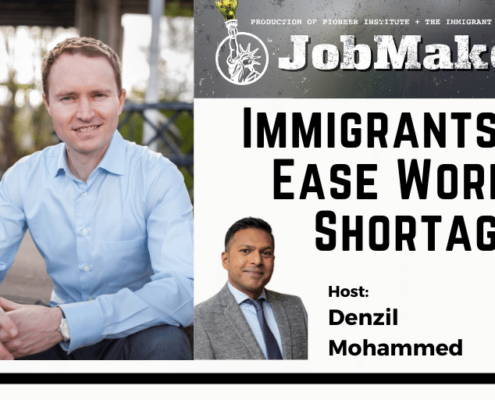
Erick Widman, Esq.: Immigrants Can Ease Worker Shortage
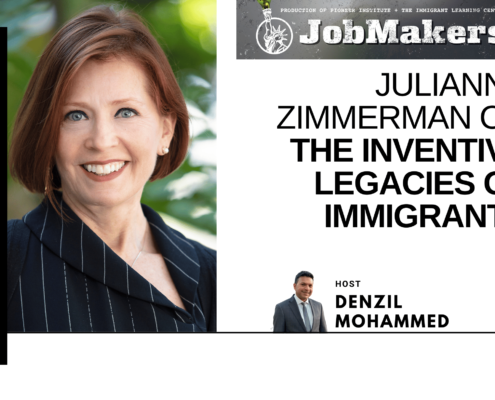
Julianne Zimmerman on the Inventive Legacies of Immigrants
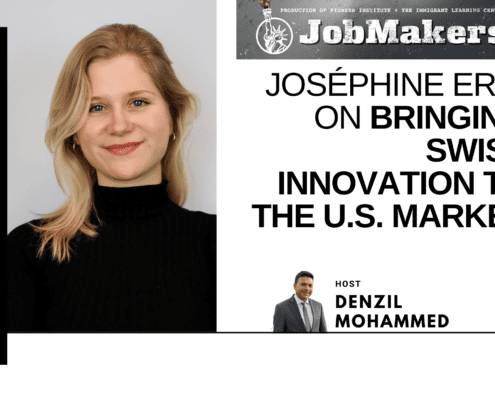
Joséphine Erni on Bringing Swiss Innovation to the U.S. Market
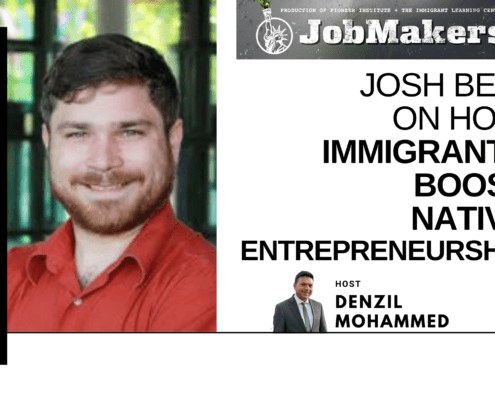
Josh Bedi on How Immigrants Boost Native Entrepreneurship
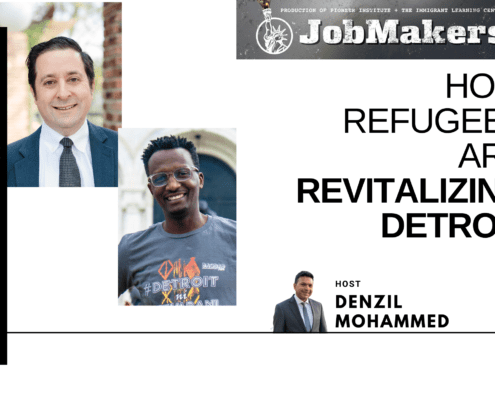
Steve Tobocman and Mamba Hamissi on How Refugees Are Revitalizing Detroit

Sheetal Bahirat Turns a Profit on Food Waste
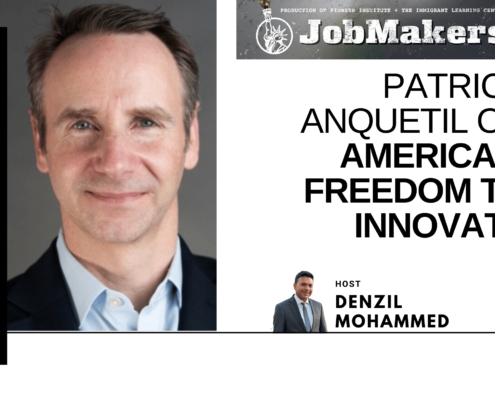
Patrick Anquetil on America’s Freedom to Innovate
